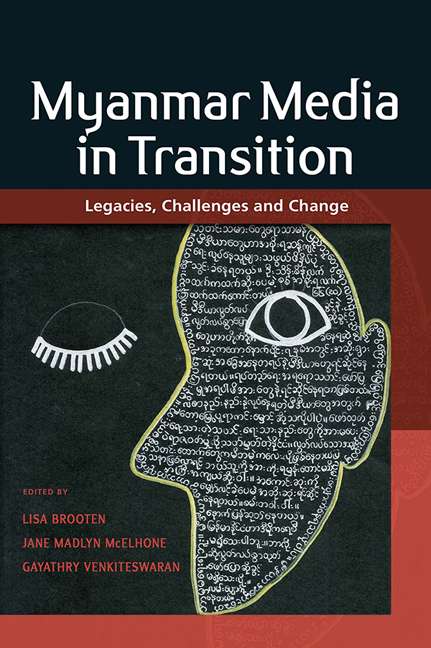Book contents
- Frontmatter
- Contents
- Contributors and Editors
- Burma or Myanmar? A Note on Terminology
- 1 Introduction: Myanmar Media Historically and the Challenges of Transition
- Part I Structural Constraints and Opportunities
- Part II Journalism in Transition
- Part III Creative Expression
- Part IV Society and Media
- Epilogue: Media Studies in Myanmar – Where Do We Go from Here?
- Index
Burma or Myanmar? A Note on Terminology
Published online by Cambridge University Press: 07 September 2019
- Frontmatter
- Contents
- Contributors and Editors
- Burma or Myanmar? A Note on Terminology
- 1 Introduction: Myanmar Media Historically and the Challenges of Transition
- Part I Structural Constraints and Opportunities
- Part II Journalism in Transition
- Part III Creative Expression
- Part IV Society and Media
- Epilogue: Media Studies in Myanmar – Where Do We Go from Here?
- Index
Summary
In editing a collection such as this one, we are faced with the issue of what to call the country: Burma or Myanmar, or both? Using which criteria? This issue has long been contentious, and any discussion of the transition period must in some way address the concerns that continue to be raised about the country's name and how it should be historically referenced.
The country became the Union of Burma upon its independence from the British in 1948. Shortly following the massive and violently suppressed uprisings of 1988, the military regime, the State Law and Order Restoration Council (SLORC), enacted the 1989 Adaptation of Expressions Law, changing the name of the country to the Union of Myanmar and many place names to reflect their Burmese-language pronunciation rather than the anglicized spellings prescribed by British colonial authorities. Rangoon, for example, became Yangon. Although the SLORC argued that the switch to Myanmar was more inclusive of ethnic minority groups, the name change was met with stiff resistance by opposition activists pushing for democratic change, who argued that it was made by an illegitimate, unelected regime without the people's approval through a national referendum. Many of those who sympathized with the opposition felt the name Burma was more inclusive than Myanmar. As a result, the use of one name over the other was, and remains for some, an indication of one's political position with respect to the military regime (Rogers 2012). The reaction of ethnic minority groups in the country has been mixed, but many feel that both names lack a sense of inclusion because they refer to the country's dominant ethnic group (Dittmer 2014).
International news outlets and governments around the world have taken different positions on this issue. The name change was recognized during military rule by the United Nations and by the governments of Japan and France, for example, but was not recognized by the United States, United Kingdom, Australia or Canada, which continued to refer to the country as Burma. The British Broadcasting Corporation (BBC) also referred to the country as Burma during the period of military rule, which they argued was due to the familiarity of the name rather than politically motivated (BBC 2007). The policy of the U.S. National Public Radio (NPR) network was to use Myanmar but to then reference the fact that the country was once called Burma (Memmott 2011).
- Type
- Chapter
- Information
- Myanmar Media in TransitionLegacies, Challenges and Change, pp. xvii - xxPublisher: ISEAS–Yusof Ishak InstitutePrint publication year: 2019

